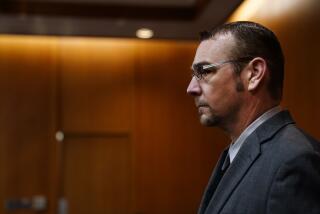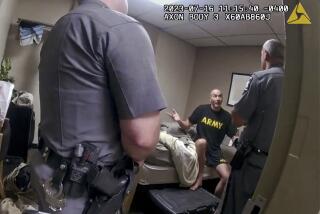Soldier pleads guilty to manslaughter in Afghan’s killing
Reporting from Joint Base Lewis-McChord, Wash.
A young Army gunner who had begged his father for help in stopping a renegade U.S. “kill team” targeting civilians for sport pleaded guilty Friday to manslaughter, becoming the eighth member of his platoon to be convicted in the most serious war crimes case arising from the Afghanistan campaign.
He was sentenced to just three years in prison after his lawyer said he was terrorized into cooperating by a squad leader who was “a monster.”
“I was afraid, and I wish I was braver. And that’s going to haunt me for the rest of my life,” Spc. Adam Winfield, 23, testified.
Army prosecutors say a band of 5th Stryker Brigade soldiers conducted premeditated killings of unarmed Afghans, collecting fingers and grotesque photos as souvenirs. They operated under the direction of Staff Sgt. Calvin Gibbs, a squad leader who fabricated “scenarios” complete with planted guns and grenades in which the brazen killings were made to look like defensive shootings of armed insurgents, prosecutors said.
Displaying a photo of the man blown up by a grenade allegedly detonated by Gibbs and his team in May 2010 while the squad patrolled a village outside Kandahar, military prosecutor Capt. Jeremy Scholtes urged the court to impose a sentence of at least 10 years as “deterrence” to other soldiers caught up in the chaos of war.
“The soldiers, rank-and-file across this post and across this country, need to know that when you engage in this kind of criminal activity, there will be a penalty,” Scholtes said.
Members of the platoon have been convicted on various charges of conspiracy, murder and illegal drug use. Jeremy Morlock pleaded guilty in March to helping murder three civilians and was sentenced to 24 years in prison and demoted from specialist to private. Morlock and Winfield are expected to testify against Gibbs, 26, who faces court-martial in October.
Winfield, who also pleaded guilty to using hashish while on guard duty, said Gibbs had threatened to kill him if he told anyone about the unit’s widespread drug use and its concocted killings of civilians.
“He said several times he’d make it seem like I’d stepped on an IED,” Winfield said, referring to an improvised explosive device, a favorite weapon that militants use against U.S. soldiers.
Suffering from depression and suicidal thoughts, Winfield sent urgent Facebook messages in February 2010 to his father, former Marine Christopher Winfield, telling him about the killings being plotted, expressing fears for his safety and asking for help.
“There are people in my platoon that can get away with ‘murder.’ They planned and went through with it,” he wrote. “I want to do something about it, the only problem is I don’t feel safe here telling anyone.”
The elder Winfield called his son’s U.S. base four times and the Department of Defense, but was reportedly told his son would have to deal with the problem through his chain of command.
“I point-blank told them that my son is saying murders are being done out there by his own guys … and he needs help,” he said in testimony, at one point breaking down, putting his glasses carefully on the witness stand and wiping his face with a tissue. “I tried to get the Army to do something. They did nothing. Absolutely nothing.”
When Gibbs singled out an Afghan man in his 50s that day, pulling him away from his wife and children, the plan was for Winfield and another soldier to begin shooting as the sergeant lobbed a grenade at him, Winfield said. He added that he fired his weapon but didn’t aim it at the man, hoping to fool Gibbs.
“At that point, sir, I didn’t really know what to say to him. I just didn’t say no, sir. I didn’t object to it,” Winfield told the judge, Col. David Conn. “His plan was … we would see this guy coming out of the compound. We would fire on him and then he would, you know, he would be dead, sir.”
Prosecutors dismissed his defenses.
“He could have reached out to any level of leadership that he could possibly get his hands on … and said, ‘I’m in fear of my life. Sgt. Gibbs is crazy, and you cannot send me back there,’” Scholtes said.
Instead, he said, Winfield did nothing.
“That [Afghan] man should have seen three U.S. Army soldiers who were there to protect him, who were there to fight for him … but instead he looked into their eyes and saw that he was going to die,” the prosecutor said.
Winfield, stationed at Joint Base Lewis-McChord in Washington state but originally from Cape Coral, Fla., could have faced 17 years in prison, and under his agreement to plead guilty faced no more than eight years. Instead, the three-year sentence will allow him to be released in as little as a year.
The judge also rejected prosecutors’ request for a dishonorable discharge, instead ordering a bad-conduct separation that will allow Winfield to continue to receive Army-paid treatment for his post-traumatic stress disorder and mild traumatic brain injury.
More to Read
Start your day right
Sign up for Essential California for news, features and recommendations from the L.A. Times and beyond in your inbox six days a week.
You may occasionally receive promotional content from the Los Angeles Times.






